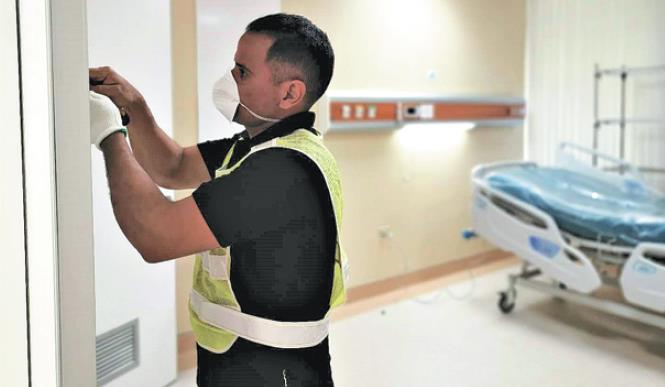Construction firms bring succor to global supply chain


Major State-owned construction companies are tackling problems brought by the COVID-19 outbreak to guarantee smooth operations overseas and help stabilize the global supply chain amid the international pandemic fight.
With help from China Railway Construction Corp, Arima General Hospital in Trinidad and Tobago was upgraded in late March to brace for pandemic prevention and control.
After renovations were complete, the emergency field hospital was equipped with 100 beds, two surgery rooms and an intensive care unit. It is one of the country's biggest and most advanced hospitals.
CRCC first began construction on the hospital in 2015. It was the State-owned company's second key project in the country, following a hospital in Scarborough. Before the Arima project was about to be delivered after five years of construction, the outbreak of the contagion added urgency to the task.
Project leader Li Dongsheng said: "Construction in a sped-up phase is especially challenging during a pandemic. But to ensure the health of locals, we are taking our responsibility and building the hospital just as we built Huoshenshan Hospital back in Wuhan."
Li said the team responded quickly to the needs of the project while controlling the number of on-site workers to prevent infection.
During the process, the team ramped up efforts to surmount difficulties and successfully upgraded the Arima hospital to treat potential infections. Over 150 construction workers labored more than 24,000 hours in total to complete the project, according to the company.
The hospital can now perform ultrasounds, physiotherapy and cardiopulmonary functionality tests. It is expected that more than 300 local medical staff will be trained to work in the hospital.
The global spread of the contagion has brought serious challenges to overseas operations. Nevertheless, CRCC has managed to win new bids abroad.
China Railway 20 Bureau Group Corp was recently informed that it won a bid to repair an 87-kilometer highway in Uzbekistan. The contract is worth $99.81 million.
In addition, CRCC International won a bid for a 210-million-yuan ($29.66 million) project in Saudi Arabia to enhance local carrying capacity of freight train lines.
Like CRCC, many other Chinese contractors have been tackling challenges overseas.
Sinoma International Engineering Co completed a cement production line in Indonesia in March, more than two months ahead of schedule. Wang Xiaojun, manager of the project, said the COVID-19 outbreak had a severe impact on on-site construction, but the whole team worked overtime to meet a tight deadline.
The early delivery of the project tested the Chinese enterprise's capabilities in facing major emergencies and enhanced its competitiveness in terms of global resource allocation, the company said.
Shanghai Zhenhua Heavy Industries Co, a State-owned heavy-duty equipment manufacturer, delivered straddle carriers to a Swedish client during the pandemic.
Shan Jianguo, vice-president of the company, said: "In the past, many container terminals around the world used straddle carriers made by European or US companies. We are a latecomer to this sector. But this order means that Chinese-made straddle carriers were exported for the first time."
Experts said once the pandemic is over, Chinese companies are expected to play a bigger role in sustaining the supply chain around the globe.
Dong Yan, director of the international trade office at the Institute of World Economics and Politics at the Chinese Academy of Social Sciences, said: "China will play an increasingly important role in stabilizing the global production chain in the post-pandemic era. Chinese companies should occupy a more core position in the global supply chain, and enhance their capabilities to mitigate potential risks."




































